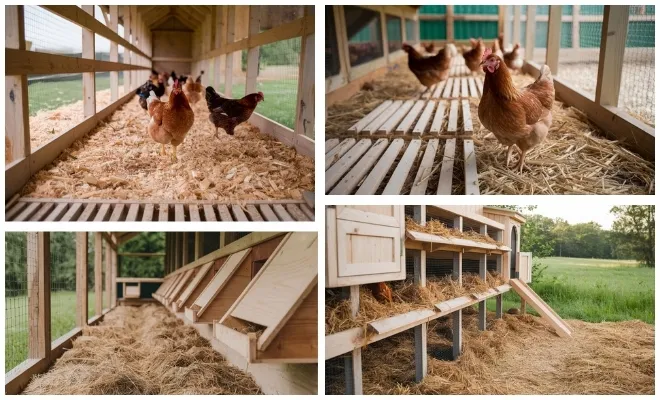Ultimate Guide to Raising Laying Ducks: Coop Setup, Feeding, & More!

Dreaming of having lots of eggs from the ducks? Proper care and raising laying ducks can be rewarding for poultry enthusiasts from beginners to experts!
But how to take care of laying ducks? Laying ducks, unlike their flighty counterparts, chickens, have their unique needs and behaviors. From providing suitable housing to ensuring a balanced diet, egg-laying ducks need all these things. Unlike chickens, ducks don’t require a huge amount of space. So, it’ll be much easier!
With a little planning and these simple tips, you can get more eggs from ducks. I’ll guide you through all the basics of duck care, from feeding and housing to health monitoring. Let’s get started!
Table of Contents
How To Take Care Of Laying Ducks? 14 Guides!

There are plenty of ways to take proper care of egg-layer ducks. It can be perfect housing, balanced feed, hygiene, and more! Let’s break down the discussion below –
1. Coop Comfort
Ducks need room to roam. So, how much space do ducks need? Aim for at least 4 square feet (3.7 m²) per duck in the coop and a fenced-in outside run if possible.
Provide a secure coop with good ventilation to prevent overheating. Keep drafts out during colder months.
Deep, dry bedding like straw or wood shavings keeps them comfy and clean. Change it regularly to avoid moisture build-up.
Offer private nesting boxes filled with soft bedding – one for every 3-4 ducks.
2. Duck Nutrition
As a balanced diet, a good commercial layer feed formulated for ducks is key. It provides the nutrients needed for healthy egg production.
Considering supplements, add grit (crushed rock) to their diet to aid digestion. Oyster shells offer extra calcium for strong eggshells.
Follow feeding recommendations on your layer feed bag. Adjust based on breed and weather.
Limited treats like chopped vegetables, fruits, or a small amount of cooked grains are okay. Avoid processed foods, citrus, and avocado.
However, here is a table of feed ratio for ducks for egg production.
Now, what treats to offer laying ducks?
When it comes to treats, your feathered friends have some favorites.
Green Light –
You can offer vegetables like lettuce, kale, spinach, carrots, or peas for a healthy snack. They enjoy berries, grapes, and chopped apples (just make sure to remove the seeds).
Offer herbs like fresh basil, parsley, or cilantro for extra flavor and nutrients. A little bit of cooked brown rice, quinoa, or barley can be a tasty treat.
Red Light!
There are some snacks to steer clear of!
While they might gobble it up, bread isn’t very nutritious. Processed Foods are bad! Chips and crackers won’t do much for their health.
As I said citrus fruits are unhealthy compared to benefits. So, avoid oranges, lemons, and grapefruits.
Special No for the Avocado due to toxicity! Besides, I suggest not to offer salty foods. Keep the pretzels and salty popcorn to yourself.
Sorry to not mention, that ducks are lactose intolerant, so skip the milk, cheese, and yogurt, too.
As a general rule of thumb, follow the tips –
- Treats should only make up a small portion of their diet, around 10%.
- Cut fruits and veggies into bite-sized pieces to prevent choking hazards.
- Keep things interesting by offering a variety of healthy treats.
- Opt for fresh fruits and veggies whenever you can.
- If your ducks turn up their beaks at something, compost it instead of tossing it in the trash.
3. Water and Hygiene

Clean, fresh water is vital! Provide a waterer that’s easy to access and clean regularly.
Choose a container that won’t be easily tipped over. Ducks like to dip their heads in, so a shallow pan or a waterer with a wide base works well.
Clean the coop regularly to prevent disease. Remove droppings and soiled bedding daily. Deep clean the coop every few months with a disinfectant safe for poultry.
4. Health Diseases and Management
Conduct regular health checks. Inspect eyes, beaks, and feet. Look for signs of illness (lethargy, abnormal droppings). Also, Egg Drop Syndrome ’76 (EDS ’76) specifically impacts egg production in laying ducks.
Isolate sick ducks and understand the illness to take proper care.
5. Egg Handling and Management
So your ducks are happy and laying a bounty of delicious eggs! Here’s how to ensure you collect, store, and enjoy them safely.
How to Collect Duck Eggs?
Collect eggs every day to keep them clean and safe. It’s best to collect eggs in the morning after your ducks have laid them. Hold eggs gently to avoid cracking. be sure you pick them up from the bottom.
How to Store Duck Eggs?
Store eggs in a cool, dry spot away from sunlight and strong smells. Keep eggs in their cartons or lay them in a single layer with the pointy end down.
If you don’t wash eggs, you don’t need to refrigerate them unless stored for over 2 weeks.
How to Wash Duck Eggs?

You can wash eggs with lukewarm water if they’re very dirty. Wash quickly, pat dry, and use within a few days.
How to Get Fresh Duck Eggs?
Following the candling idea to shining a light through eggs can help spot any issues.
6. Light Exposure
Ducks’ egg production is influenced by the amount of light they receive. During shorter days (typically from July to December). Provide artificial light to ensure a total of 14 hours of light daily.
7. Protecting Ducks from Predators
Ducks are vulnerable to various predators, including foxes, raccoons, and birds of prey. Install secure fencing around the duck coop and run area. Also, deter nocturnal predators with motion-activated lights or alarms.
Recommended Reads:
8. Addressing Egg-Related Problems
Occasionally, ducks may lay soft-shelled eggs. So, provide extra calcium through crushed oyster shells or a calcium supplement. Ensure a balanced diet rich in nutrients.
If a duck struggles to lay an egg (egg binding), seek immediate veterinary assistance. This condition can be life-threatening.
9. Managing Behavioral Issues
Some ducks can be aggressive, especially during breeding season. Separate aggressive ducks to prevent injuries.
Broody ducks want to hatch eggs. If you’re not breeding, discourage broodiness by removing eggs promptly. Broody ducks may neglect their own health.
Recommended Article: 32 Different Behaviors In Ducks
10. Environmental Challenges

Ducks are hardy but sensitive to extreme weather conditions. So, ensure shade during hot days to prevent heat stress.
Remember, the less stress egg-laying ducks have, the higher their egg production will be.
Also, you need to insulate the coop adequately during winter. Besides, ensure the coop is waterproof and draft-free.
11. Entertainment and Swimming Area
Ducks love water! If possible, create a small pond or provide a kiddie pool for them to splash around.
Ducks maintain their plumage by taking dust baths. Provide a dry area with fine sand or dirt for them to roll in.
12. Foraging Area or Free-Range Opportunities
Allow ducks to free-range during the day. They’ll find insects, worms, and greens, which supplement their diet and keep them active.
Ducks love exploring. Create a safe outdoor space where they can roam and forage.
13. Providing Shade and Shelter
Ducks need shade to avoid overheating. Trees, shrubs, or artificial shade structures work well.
Ensure the duck coop is well-ventilated, dry, and predator-proof. Nesting boxes should be cozy and secure.
14. Avoiding Toxic Substances
Ducks may nibble on plants but they never know about the toxicity!
So, remove any toxic plants from their environment. Also, keep ducks away from pesticides, herbicides, and other chemicals.
Altogether these guides will help you get benefits for your poultry purpose. The ideas will be even better for raising backyard ducks.
Related Articles:
See the video for the process of raising and laying ducks!
FAQs
Want to know more about caring tips for laying ducks? Check out the Q&A section!
Q. How often should I clean the duck coop?
Aim for spot cleaning daily (removing droppings) and a deep clean with a poultry-safe disinfectant. It can be every few months.
Q. How can I improve the quality of my duck eggs?
Provide a balanced layer feed, oyster shells for calcium, and fresh water.
Q. Can laying ducks eat chicken feed?
No! Laying ducks have different nutritional needs than chickens. Stick to a commercial layer feed formulated specifically for ducks.
Conclusion
Now it’s clear that with the right care and attention, you can have a plentiful supply of eggs from ducks. Remember, providing suitable housing, balanced nutrition, and a clean environment are key. By following the tips outlined here, from coop setup to egg handling, you can create an ideal environment for them.
So, whether you’re a novice duck keeper or a seasoned pro, keep these guidelines in mind. With dedication and a little duck love, you’ll soon be enjoying duck laying lots of eggs!






